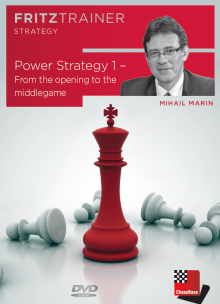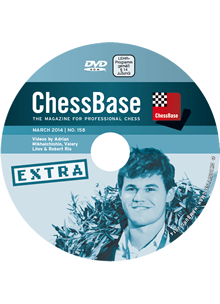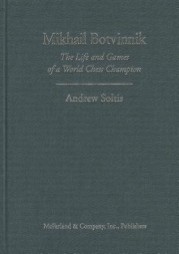
Mikhail Botvinnik
The Life and Games of a World Chess
Champion by Andy Soltis
2014
McFarland &
Company,Inc.,Publishers Box 611
Jefferson,North Carolina 28640.
http://www.mcfarlandpub.com
274pages
Price $49.95
ISBN
978-0-7864-7334-3
This latest book from Andrew Soltis on the great Mikhail
Botvinnik, is not only good for 88 of his ever best games but it covers
more background
information on the person Botvinnik,that I ever have
ever seen on print before!
Mikhail Botvinnik was for sure one of the greatest players of all
time,and a important key figure in the development of chess in the
Soviet Union.
As we can read in this book Botvinnik had rules for almost
everything. Many where based on his own experience. He refused to teach
his daughter
how to play chess when she was young because he did not
learn until she was 12.
He even discouraged her when she wanted to learn
at age 4.But she eventually did learn,he not only told her what to read
but how to hold a book.
His capacity for work was legendary.He
reservered the highest praise for
chess players who where:
“researchers”. Players who didn’t meet his standards were”lazy”,term he
applied to even Smyslov, Mikhail Tal and Ragozin.
As profound a thinker as Botvinnik was he could be astoundingly
wrong,world class wrong.
He spent his final 30 years working” in the wrong direction in
computers,”Yuri Averbakh pointed out.Botvinnik tried to perfect a chess
algorithm that
emphasized evaluation rather than calculation and brute
force.Botvinnik wanted to make a machine that works like our brain. But
he did not know how
our brain works,”Averbakh said, His program,
Pioneer was a failure.
Boris Gulko said,”Botvinnik was a Communist by conviction….He was by
any measure honest and sincere. He considered that Communism was the
future and declared that Soviet people were the best on the planet.
Botvinnik’s final event was supposed to be a match with Fischer
in the Spring of 1970,to mark the 75th anniversary of Chess Society of
Leiden,the Netherlands.
Botvinnik and Fisher negotiated indirectly,through the Dutch
organizers.The Dutch were on a fool’s errand.Botvinnik wanted a best of
16 game match,an
indication that he didn’t have the stamina for the 24
game format that he had once considered sacred.But Fischer wanted no
limit on games.The winner should
be first to score six victories,he
said.
But the match collapsed because of what Botvinnik called American’s
“maniacal” fear of returning the board.The Dutch organizers replaced
the match with a four player tournament.
One of my favourite Botvinnik games is: Rabinovich,Ilya Leontievich -
Botvinnik,Mikhail [C19]
URS-ch11 Leningrad (4), 1939
1.e4 e6 2.d4 d5 3.Nc3 Bb4 4.e5 c5 5.a3 Bxc3+ 6.bxc3 Ne7 7.Nf3 Bd7 8.a4
Qa5 9.Qd2 Nbc6 10.Bd3 c4 11.Be2 f6 12.Ba3 0-0-0
13.0-0 Nf5 14.g4 Nfe7
15.Rfb1 Qa6 16.a5 Rdf8 17.Ne1 fxe5 18.Nd3 cxd3 19.Bxd3 Qxa5 20.Bxe7 Qc7
21.Bxf8 Rxf8 22.Bb5 Rf4
23.h3 a6 24.Bxc6 Bxc6 25.Re1 e4 26.Re3 Bb5
27.Rg3 g5 28.Kg2 Qf7 29.Qe3 Qf6 30.Re1 Be8 31.Qe2 Kb8 32.Rb1 Bb5 33.Qe3
Be8
34.Qe2 Kc7 35.Rh1 Bg6 36.Re1 Be8 37.Rh1 h5 38.Kg1 Bb5 39.Qe1 h4
40.Re3 Bc4 41.Rh2 b6 42.Qa1 Qf8 43.Rg2 a5 44.Qa4 Qe7
45.Qa1 Kb7 46.Qa4
Rf8 47.Re1 Qd6 48.Qa1 Ka6 49.Re3 b5 50.Qb2 Rf3 51.Kh1 Rf6 52.Kg1 Kb6
53.Rh2 Rf7 54.Rg2 Rf3 55.Kh1 Rf8
56.Kg1 Rf6 57.Rh2 Kc6 58.Rg2 Rf3
59.Kh1 Bf1 60.Rxf3 exf3 61.Rh2 a4 62.Kg1 a3 63.Qc1 Bc4 64.Qxg5 a2
65.Qc1 e5 66.dxe5 Qxe5 67.Qa1 Qe2 0-1.
Rabinovich a match physics doctorate pion of Ukraine from Kiev,had
mastered 10 languages and had little time for chess.
This classic beauty comes with 128 diagrams, 12 photos, chronology,
appendices, notes, bibliography, indexes and library binding.
Conclusion: One of those McFarland
super reads!
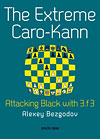
The Extreme Caro-Kann
Attacking Black with 3.f3
by Alexei Bezgodov
2014
New in Chess
http://www.newinchess.com/
271 pages
Price € 25,95
ISBN:
978-90-569-1469-1
The Russian Grandmaster Alexey Bezgodov {1969}has managed
to create a heavy weight of 270 pages on the move order 1.e4 c6 2.d4 d5
3.f3!?
Some authors considers the move 3.f3 as a plan bizarre and the move
3.f3 did not even make it into the latest Dangerous Weapons book
on the Caro-Kann,
but it was Peter Wells who wrote in his book The
Caro – Kann,Gambit 2007: For White to take away such a good developing
square as f3 from his pieces at such an early stage requires a
serious justification. But Wells leaves it all behind with one model
games, and our
friend Alexey Bezgodov,does it all with over 68 well analysed
move to move model games.
Probably the best way to meet the move 3.f3 is with 3…e6 the so called
The Semi-French Variation, but the move 3…e6 is not everybody’s taste.
But as we can learn from Bezgodov there is also the move 3…g6.
David Przepiorka once went for 3…dxe4 but went astray in no time:
Tartakower,Saviely - Przepiorka,Dawid [B12]
Budapest Budapest, 1929
1.e4 c6 2.d4 d5 3.f3 dxe4 4.fxe4 e5 5.Nf3 exd4 6.Bc4 Be6 7.Bxe6 fxe6
8.0-0 Be7 9.Nxd4 Qd7 10.Qh5+ Kd8 11.Be3 c5
12.Rd1! cxd4 13.Rxd4 Bd6 14.e5 Nf6 15.exf6 gxf6 16.Nc3 1-0.
In the spirit of the King’s Gambit is 1.e4 c6 2.d4 d5 3.f3 dxe4 4.fxe4
e5 5.Bc4 Qh4+ 6.Kf1 Qxe4 7.Nf3 Be6 8.Bxe6 fxe6
9.Nc3 Qf5 10.dxe5 Nd7 11.Qd3 with a even game.
Several hundred games have been played from this position, with
catastrophic statistics for black. But as Bezgodov honestly
explains I am not totally convinced about how much white really has.
Conclusion: Out play your opponent with the dangerous 3.f3!?
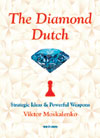
The Diamond Dutch
Strategic Ideas & Powerful Weapons
by Viktor Moskalenko
2014
New in Chess
http://www.newinchess.com/
270 pages
Price € 26,95
ISBN:
978-90-569-1441-7
The great Viktor Moskalenko comes with a creative made
coverage of the Dutch with lines, as The Stonewall System, The
Classical
System and The Leningrad System,but also included are various Anti
Dutch Lines as for example the feared Staunton Gambit: 1.d4 f5
2.e4 fxe4 3.Nc3 Nf6 4.Bg5 c6 5.f3 e3 6.Bxe3 d5 7.Qd2 Nbd7 8.0-0-0 b5
9.g4 Nb6 10.h4 e6 11.h5 b4 12.Nb1 Nc4 13.Qe1 Qa5 14.g5 Nd7
15.a3 Ndb6 16.b3 Nxe3 17.axb4 Qxb4 18.Qxe3 a5 19.Qc3 Bd6 20.Nh3 0-0
21.Be2 e5 22.dxe5 Qxc3 23.Nxc3 Bxe5 24.Nb1 a4 25.bxa4
Nxa4 26.Rdg1 Rb8 27.f4 Rxf4 28.c3 Bf5 0-1, Raetsky,Alexander (2442) -
Korobov,Anton (2657) [A83]Abu Dhabi op 20th Abu Dhabi (5) 2010.
Yes the Ukraine champion Anton Korobov is regarded as one of the best
players against computer related lines.
The move 2.e4 is popular under club players but as we can learn from
Moskalenko, but not so dangerous for black, if he knows what he is
doing.
In fact, the Dutch opening is quite reversible as we can see in the
following model game from Moskalenko: Aloma Vidal,Roberto (2402) -
Moskalenko,Viktor (2532) [A85]
Salou op 14th Salou (4), 06.05.2012
1.d4 e6 2.c4 f5 3.Nc3 Nf6 4.e3 g6 5.g3 Bg7 6.Bg2 0-0 7.Nge2 d6 8.b3 Qe8
9.0-0 e5 10.dxe5 dxe5 11.Nd5 Rf7 12.Nxf6+ Rxf6 13.e4 Nc6
14.Bb2 Rf7 15.exf5 gxf5 16.Re1 Be6 17.Bd5 Bxd5 18.cxd5 Rd8 19.Nf4 Nb4
20.Ne6 Rxd5 21.Nxg7 Rxg7 22.Qf3 Qe6 23.Rad1 Rgd7
24.Rxd5 Rxd5 25.Re3 e4 26.Qe2 Nd3 27.Ba1 Qc6 28.Qh5 Qg6 29.Qh4 h6
30.Qe7 Qf7 31.Qh4 Kh7 32.f3 Nc5 33.Bc3 Rd1+ 34.Kg2 Rd7
35.Qf4 Nd3 36.Qh4 Nc5 37.Qf4 Qd5 38.Qh4 exf3+ 39.Rxf3 Ne4 40.Kg1
Nxc3 0-1,where it easy can turn into a Leningrad or a Classical,or vice
versa.
As Moskalenko explains: I like such positions with black, and will
surely try this in future games.
The Diamond Dutch is not a repertoire book and that makes it all very
special, specially with the wealth of novelties that I found in this
book!
For example: 1.d4 f5 2.Nf3 Nf6 3.g3 g6 4.Bg2 Bg7 5.c4 0-0 6.Nc3 d6
7.0-0 Nc6 8.d5 Ne5!?
Moskalenko: Again due to the influence of recent games and books,today
this move is less frequent in regular tournaments.
But in my own GM practice it has worked perfectly. There is no
official refutation of the line and, what’s more, it still appears in
many games
by Hikaru Nakumura.
Conclusion: This book is overloaded with astounding ideas!
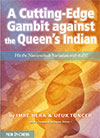
A Cutting-Edge Gambit against the Queen’s Indian
Hit the Nimzowitsch Variation with 6.d5!
by Ufuk Tuncer & Imre Hera
2014
New in Chess
http://www.newinchess.com/
174 pages
Price € 26,95
ISBN:
978-90-569-1497-4
Ufuk Tuncer & Grandmaster Imre Hera has managed to
create a 174 page,move to move study of the move 5.d5 in the Queen’s
Indian 1.d4 Nf6 2.c4 e6
3.Nf3 b6 4.g3 Ba6 5.Qc2 c5 6.d5.
This pawn sacrifice has been tremendously popular among top GMs ever
since Vallejo Pons beat Macieja at the 2006 Turin Olympiad. The entire
variation
has been analysed at amazing depth but both authors have managed to
create a readable overview, where all material is divided into three
Hugh sections: Black Declines, Black Accepts with 8…Bxd5 and Black
Accepts with 8….Nxd5.
The main line runs as 1.d4 e6 2.c4 Nf6 3.Nf3 b6 4.g3 Ba6 5.Qc2 c5 6.d5
exd5 7.cxd5 Bb7 8.Bg2 Nxd5 9.0-0 Be7 10.Rd1 Qc8 11.a3 Nf6
12.Bg5 0-0 13.Nc3 Rd8 14.Nh4 g6 and now both authors give the brilliant
15.Nf5!! By the way not mentioned in any publication before!
As Shirov explains in the foreword; This book shows exactly why the
line is so attractive for white players. Fascinating chess, great
complexity, chances to create
fantastic attacking possibilities.
Conclusion: This book shows us as no other the development of
modern chess.
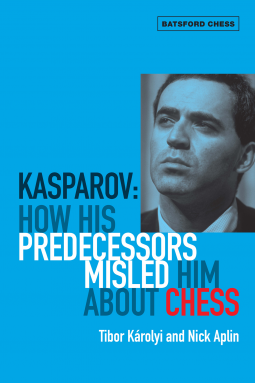
Kasparov: How His Predecessors Misled Him About Chess
by Tibor Karolyi& Nick Aplin
2014
https://www.facebook.com/batsfordbooks
EBook
Price GBP 9.50
ISBN 9781849941778
Both authors Tibor Karolyi and Nick
Aplin cover in a humoristic {KingPin way}, but in a very instructive
way the unbelievable losses
of the greatest player of all time,the great Garry Kasparov.
But also “Kasparov’s” view on his contemporaries makes this book
more than worth reading,specially with Tibor Karolyi and Nick
Aplin enjoyable thinking notes from the so called Kasparov.
As we can read,it was Karpov who learned Kasparov to play and
understand simple positions,from the legendary Bobby
Fischer he learned to play The Najdorf.
Garry learned from Botvinnik to play on the edge of the
board,especially the h file was his favourite.
There are not many players who where able to outplay Kasparov and some
even gave up chess as the talented
Dutch player Jeroen Piket,who was even able to win twice from Kasparov:
Piket,Jeroen (2670) - Kasparov,Garry (2805) [D97]
Amsterdam Euwe Memorial Amsterdam (6), 18.05.1995
1.d4 Nf6 2.c4 g6 3.Nc3 d5 4.Nf3 Bg7 5.Qb3 dxc4 6.Qxc4 0-0 7.e4 Na6
8.Be2 c5 9.d5 e6 10.0-0 exd5 11.exd5 Re8
12.Rd1 Bf5 13.d6 h6 14.Bf4 Nd7 15.Rd2 Nb4 16.Qb3 Be6 17.Bc4 Nb6 18.Bxe6
Rxe6 19.Na4 Re4 20.Bg3 Nc4
21.Nxc5 Nxd2 22.Nxd2 Re2 23.Qxb4 a5 24.Qxb7 Rxd2 25.d7 Rxb2 26.Qd5 Rb5
27.Rd1 Bf8 28.Bd6 Bxd6
29.Qxd6 Rab8 30.h3 Rb1 31.Rxb1 Rxb1+ 32.Kh2 Rb6 33.Qe5 Kf8 34.Qh8+ Ke7
35.Qe5+ Kf8 36.f4 h5
37.Qd5 h4 38.Qe5 g5 39.Qh8+ Ke7 40.Qe5+ Kf8 41.fxg5 1-0 and
Piket,Jeroen (2633) - Kasparov,Garry (2851) [A34]
KasparovChess GP g/60 Internet (4.2), 20.02.2000
1.Nf3 Nf6 2.c4 c5 3.Nc3 d5 4.cxd5 Nxd5 5.g3 Nc6 6.Bg2 Nc7 7.d3 e5 8.0-0
Be7 9.Nd2 Bd7 10.Nc4 0-0
11.Bxc6 Bxc6 12.Nxe5 Be8 13.Qb3 Bf6 14.Ng4 Bd4 15.e3 Bxc3 16.Qxc3 b6
17.f3 Bb5 18.Nf2 Qd7
19.e4 Ne6 20.Be3 a5 21.Rad1 Rad8 22.Rd2 Qc6 23.Rc1 Qb7 24.a3 Nd4 25.Kg2
Rc8 26.Rb1 Rfd8
27.Bxd4 Rxd4 28.b4 axb4 29.axb4 Qd7 30.bxc5 bxc5 31.Rbb2 h6 32.Ra2 Kh7
33.Ra5 Rd8 34.Qxc5 Bxd3
35.Rxd3 Rxd3 36.Nxd3 Qxd3 37.Ra2 Qb3 38.Qc2 Qxc2+ 39.Rxc2 h5 40.f4 g6
41.e5 Rd3 42.Kh3 Re3
43.Kh4 Kg7 44.Kg5 Re1 45.Rc7 Re2 46.Re7 Ra2 47.f5 gxf5 48.e6 h4
49.Rxf7+ Kg8 50.Kf6 1-0.
For the printed edition please see: http://chessbooks.nl/
Conclusion:All
together we have here a very enjoyable read!
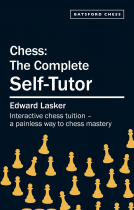
Chess:The Complete Self-Tutor by Edward Lasker
2014
https://www.facebook.com/batsfordbooks
EBook
Price GBP 10.99
ISBN 9780749941723
Edward Lasker (December 3, 1885 – March 25, 1981) was a strong
German-American chess and Go player. He was awarded the
title of International Master of chess by FIDE. Lasker was an engineer
by profession, author and family of the great Emanuel Lasker.
For a long time Edward was not aware that he was family of Emanuel till
before his death that someone has shown him a Lasker family tree.
Edward was a very good chess teacher and this Ebook is a nice example
of his educative talents, Edward does not only lean you the rules of
play,but
offers in 188
instructive sections the secrets of play.
Here the reader has to work to solve the solutions and that makes this
Ebook after so many years still very interesting to take up!
Even included is for example the first theory lines of the Polugayevsky
Variation and Bobby Fischer’s smashing win against
Robert Bryne, who had in the fifth grade a I.Q from a genius.
Conclusion: Simple but strong learning book!
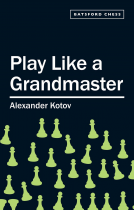
Play Like a Grandmaster by Alexander Kotov
2014
https://www.facebook.com/batsfordbooks
EBook
Price GBP 5.99
ISBN 9781849941709le
A other classic reprint is this famous
strategy book from Boris Ivkov,
Play Like a Grandmaster by Alexander Kotov,that goes back to the dark
days
of the USSR.
Originally this book comes out of a series from three: Play Like a
Grandmaster and Train Like a Grandmaster.
Chapter one of this book with all the strange analyses did not impress
me very much, but the other chapters
Planning, Combinational Vision,Calculation and Practical Play are truly
suburb written.
Kotov learns you to analyse in a more organized way,sometimes it can
get very complicated, and the reader has to
take care he does not get lost in the so called "Kotov Syndrome".
This syndrome appears when a player thinks for a very long time in a
deep position,and gets lost in the analyses.
Included are exercises to see if you have understood it but this book
will certainly help you to understand chess much better.
Conclusion: One of those books that lead you to mastership in chess!
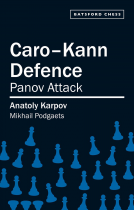
Caro-Kann Defence by Anatoly Karpov& Mikhail Podgaets
2014
https://www.facebook.com/batsfordbooks
EBook
Price GBP 10.99
ISBN 9781849941716
The paper edition from 2006 has been pleasantly converted into a Ebook
with lovely features
and safely packed in Adobe Digital Editions.
It surprised me how fast I was used with this Ebook on my laptop,from
Anatoly Karpov and Mikhail Podgaets.
Compared with the printed edition I slightly disappointed there was no
new input of material.
Anatoly Karpov and Mikhail Podgaets are covering in this second volume
openings book on the Caro_Kann defence the
Panov Attack,a opening that is based on the idea to to turn the
play into an open game,but happy enough black has various
defences and interesting strategies that offer hem reasonable chances
for a good game of play.
Interesting enough this openings play is very related
to the Queen’s Gambit Accepted and Semi –Tarrasch defences.
The whole material from Karpov and Podgaets is divided in to six {heavy
loaded}chapters; 1.e4 c6 2.d4 d5 3.exd5 cxd5 4.c4 Nf6
5.Nc3 Nc6 6.Nf3, 1.e4 c6 2.d4 d5 3.exd5 cxd5 4.c4 Nf6 5.Nc3 Nc6 6.Bg5,
1.e4 c6 2.d4 d5 3.exd5 cxd5 4.c4 Nf6 5.Nc3 g6, 1.e4 c6
2.d4 d5 3.exd5 cxd5 4.c4 Nf6 5.Nc3 Nc6 6.Nf3Nc6, 1.e4 c6 2.d4 d5 3.exd5
cxd5 4.c4 Nf6 5.Nc3 Nc6 6.Nf3 Bb4, 1.e4 c6 2.d4 d5 3.exd5 cxd5
4.c4 Nf6 5.Nc3 Nc6 6.Nf3 Be7,where all material is covered with the so
called intensive move to move annotations but always with enough
text to keep it all very readable.
Included is a interesting chapter on the Steiner system 1.e4 c6 2.c4
called after Lajos Steiner who played quite some memorable games
with this simple looking move,this chapter with it’s 30 pages can be
considered as very extensive.
As volume one there are illustrated games, this time twelve all to
supplement the theory of the Panov Attack but unfortunately there is no
bibliography.
Conclusion: Recommended to all Caro-Kann players!
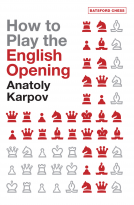
How to Play the English Opening in Chess by Anatoly
Karpov
2014
https://www.facebook.com/batsfordbooks
EBook
Price GBP 6.50
ISBN 9781849941303
A other instructive made Ebook comes from the master of explanation
Anatoly Karpov,who has remained at the very top level of world chess
for more than a quarter of a century.
Anatoly Karpov provides the player with a selection of 30 deeply
annotated 1.c4 games.
The author himself is responsible for 17 games in this book where a few
of them even go back to the German edition of Anatoli Karpow
Englisch,Beyer Verlag 1999.
But this German edition can not stand in no way up against this
Batsford work,the annotations here are much more deeply as for example
after 1.c4 e5 2.Nc3 Nf6 3.Nf3 Nc6 4.g3 Bb4 5.Bg2 0-0 6.0-0 e 7.Ng5 Bxc3
8.bxc3 Re8 9.f3 e3 10.dxe3 Karpov
spends nearly 1.5 pages on the move 10..Qe7! {from the game Kasparov –
Sadvakasov,Astana 2001}
Karpov writes: An interesting manoeuvre, allowing the black queen to be
effectively included in the struggle via the c5 square. Such an idea
has already been seen before, but implemented only a couple of moves
later.
Karpov has made a careful selection of games that are important for the
chess theory of the English opening.
Pleasant to mention is that you find Karpov playing on both sides of
the board
Some games as Karpov Ftacnik,Saloniki 1988 is truly analysed to the
last move,exactly counted 93 moves where black had to face a ending
from knight against rook where Karpov managed to win in a study
like way.
Conclusion: A highly instructive
timeless learning book on the English
Opening!










